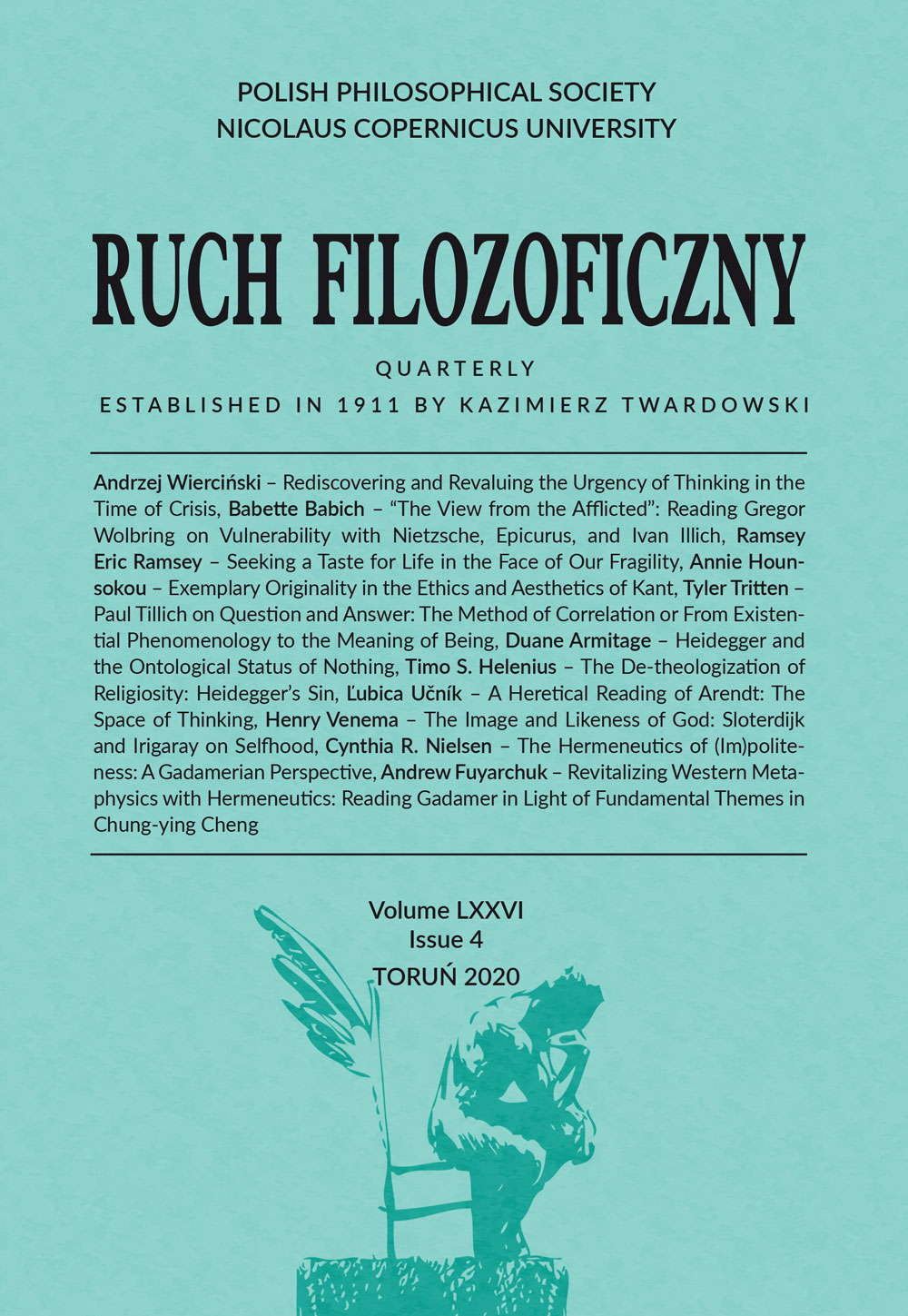The De-theologization of Religiosity: Heidegger’s Sin
DOI:
https://doi.org/10.12775/33065Słowa kluczowe
Heidegger, Augustine, Luther, facticity, sinAbstrakt
It is hard not to agree with the thesis that Heidegger’s early work presented a distinct theological horizon that, in turn, provided a platform for the further development of phenomenology in Being and Time. In order to bring this existing discussion and widely shared scholarly conviction of Heidegger’s “de-theologization” of religiosity into contact with dogmatically expressed theological anthropology, the essay will explore Heidegger’s understanding of sin as expressed in his pre-Kehre texts. This essay will, therefore, focus on a selection of Heidegger’s analyses of “sin” from his 1920–1921 lecture course on the phenomenology of religion up to his 1927 lecture on “Phenomenology and Theology” as an exploration to the thought that finds its expression in Being and Time. Hence, this essay argues from its specific vantage point in a secondary fashion that Heidegger continued, beyond his early years in Freiburg and Marburg, to import theological insights into his own work. This proposal of the continued importance of theology in Heidegger’s work, albeit in a modified or in some ways de-theologized manner, is affirmed by Heidegger’s comments of it in Being and Time.
Bibliografia
Barash Jeffrey Andrew. 2010. “Theology and the Historicity of Faith in the Perspective of the Young Martin Heidegger”, transl. Isabel Taylor. In: A Companion to Heidegger’s Phenomenology of Religious Life, ed. Sean J. McGrath and Andrzej Wierciński, 93–113. Amsterdam and New York: Brill-Rodopi.
Coyne Ryan. 2015. Heidegger’s Confessions: The Remains of Saint Augustine in Being and Time and Beyond. Chicago and London: The University of Chicago Press.
Dahlstrom Daniel. 2006. “The Phenomenological Reformation in Heidegger’s Early Augustine Lectures”. In: The Influence of Augustine on Heidegger: The Emergence of an Augustinian Phenomenology, ed. Craig de Paulo, 187–219. Lewinston, NY: The Edwin Mellen Press.
Fritsch Matthias. 2006. “Cura et Casus: Heidegger and Augustine on the Care of the Self”. In: The Influence of Augustine on Heidegger: The Emergence of an Augustinian Phenomenology, ed. Craig de Paulo, 89–113. Lewinston, NY: The Edwin Mellen Press.
Greisch Jean. 1994. “Le problème de la chair: Un ‘ratage’ de Sein und Zeit”. In: Dimensions de l’exister, ed. Ghislaine Floviral, 154–177. Louvain et Paris: Éditions Peeters.
Hart James G., John C. Maraldo. 1976. “Translators’ Commentary”. In: The Piety of Thinking: Essays by Martin Heidegger, ed. James G. Hart and John C. Maraldo, 73–207. Bloomington: Indiana University Press.
Heidegger Martin. 1996. Being and Time, transl Joan Stambaugh. Albany, NY: SUNY Press.
Heidegger Martin. 1976. “Conversation with Martin Heidegger; recorded by Hermann Noack”. In: The Piety of Thinking, ed. James G. Hart, John C. Maraldo, 59–71. Bloomington: Indiana University Press.
Heidegger Martin. 2007. “Letter to Engelbert Krebs on His Philosophical Conversion”. In: Becoming Heidegger: On the Trail of His Early Occasional Writings, 1910–1927, ed. Theodore Kisiel and Thomas Sheehan, 95–96. Evanston, Illinois: Northwestern University Press.
Heidegger Martin. 1969. “The Onto-Theo-Logical Constitution of Metaphysics”. In: Identity and Difference, transl. Joan Stambaugh, 42–74. New York, Evanston, London: Harper & Row.
Heidegger Martin. 1999. Ontology: The Hermeneutics of Facticity, transl. John van Buren. Bloomington and Indianapolis: Indiana University Press.
Heidegger Martin. 1998. “Phenomenology and Theology”. In: Pathmarks, ed. William McNeill, transl. James G. Hart and John C. Maraldo, 39–62. Cambridge and New York: Cambridge University Press.
Heidegger Martin. 2004. The Phenomenology of Religious Life, transl. Matthias Fritsch and Jennifer Anna Gosetti-Ferencei. Bloomington and Indianapolis: Indiana University Press.
Heidegger Martin. 2002. “The Problem of Sin in Luther”. In: Supplements: From the Earliest Essays to Being and Time and Beyond, transl., ed. John van Buren, 105–110. Albany, NY: SUNY Press.
Hung Yu-Yuan. 2020. “Heidegger’s understanding of the relation between his ontological concept of ‘being-guilty’ and Luther’s theological concept of ‘sin’”. International Journal of Philosophy and Theology 81, 2: 120–135.
Kisiel Theodore. 2006. “Situating Augustine in Salvation History, Philosophy’s History, and Heidegger’s History”. In: The Influence of Augustine on Heidegger: The Emergence of an Augustinian Phenomenology, ed. Craig de Paulo, 53–87. Lewinston, NY: The Edwin Mellen Press.
Luther Martin. D. Martin Luthers Werke: Kritische Gesamtausgabe. Weimar: Hermann Böhlaus Nachfolger.
Macquarrie John. 2006. “Preface”. In: The Influence of Augustine on Heidegger: The Emergence of an Augustinian Phenomenology, ed. Craig de Paulo, iii–vi. Lewinston, NY: The Edwin Mellen Press.
Moran Dermot. 2010. “Choosing a Hero: Heidegger’s Conception of Authentic Life in Relation to
Early Christianity”. In: A Companion to Heidegger’s Phenomenology of Religious Life, ed. Sean J. McGrath and Andrzej Wierciński, 349–375. Amsterdam and New York: Brill-Rodopi, 2010.
Severson Richard James. 1995. Time, Death, and Eternity: Reflecting on Augustine’s Confessions in Light of Heidegger’s Being and Time. Lanham, MD: The Scarecrow Press.
Wierciński Andrzej. 2019. Existentia Hermeneutica: Understanding as the Mode of Being in the World. Zürich: LIT Verlag.
Wolfe Judith. 2013. Heidegger’s Eschatology: Theological Horizons in Martin Heidegger’s Early Work. Oxford: Oxford University Press.
Zaborowski Holger. 2010. “A ‘Genuinely Religiously Orientated Personality’: Martin Heidegger and the Religious and Theological Origins of his Philosophy”. In: A Companion to Heidegger’s Phenomenology of Religious Life, ed. Sean J. McGrath and Andrzej Wierciński, 3–19. Amsterdam and New York: Brill-Rodopi.
Sheehan Thomas. 1979. “Heidegger’s ‘Introduction to the Phenomenology of Religion, 1920–21”, The Personalist 60, 3: 312–324.
John Van Buren’s commentaries on Heidegger and Luther, particularly in his The Young Heidegger (Bloomington: Indiana University Press, 1994) and his article “Martin Heidegger, Martin Luther”. In: Reading Heidegger from the Start, ed. Kisiel and van Buren (Albany, NY: SUNY Press, 1994), as well as Christian Sommer, Heidegger, Aristote, Luther (Paris: Presses Universitaires de France, 2005).
Pobrania
Opublikowane
Jak cytować
Numer
Dział
Statystyki
Liczba wyświetleń i pobrań: 1044
Liczba cytowań: 0



